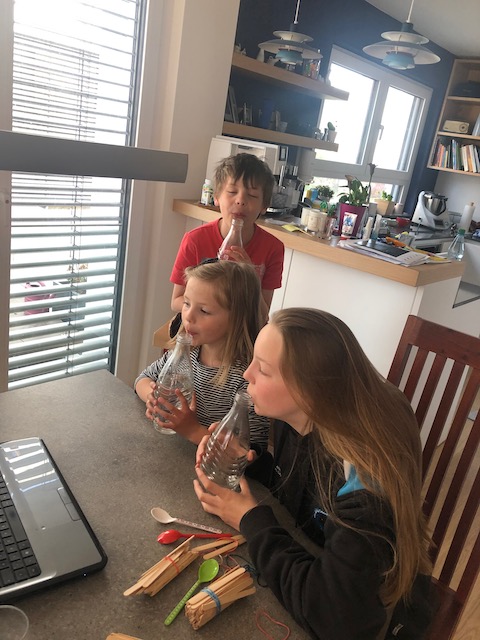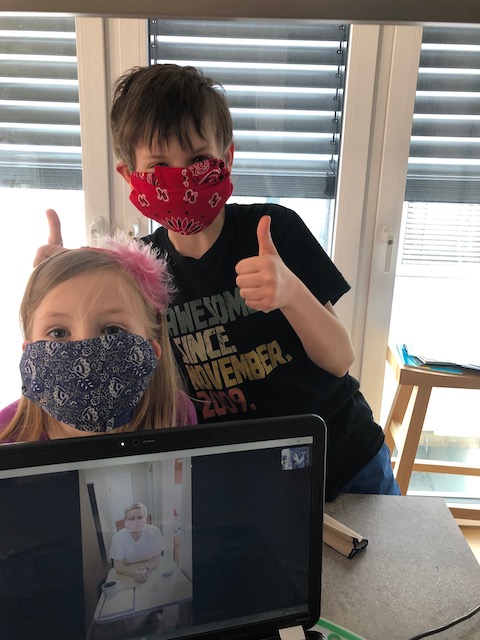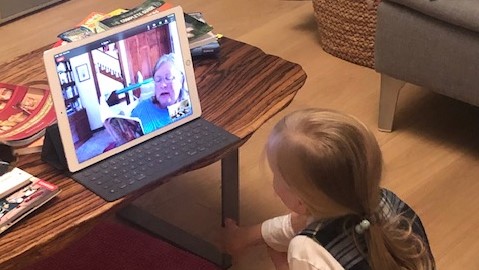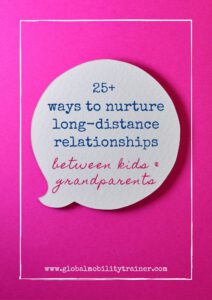(Note: I use the term grandparents here but it’s representative of all distance relations, anyone that wants to stay close to the children living abroad and build & maintain connections with them.)
Do you miss visiting your family as much as I do? Do you feel the intense pain and grief of not being able to give your dad a hug? Of missing the anticipation and joy of going to the airport to pick your mom up after her long flight to come see you? The backs of my eyes prickle just writing this.
Many families the world over have spent large parts of 2020 struggling with a challenge all too familiar to expat families: how to stay close when you’re not physically near each other (or not allowed to be)?
Let me tell you what I’ve learned from a lifetime of nurturing long-distance connections.
Building connections pre-Internet
I grew up as a Third Culture Kid* in the late 1970’s & 80’s. We lived 8000km from our grandparents during a time when phone calls were prohibitively expensive. Computers, smart phones and the Internet might have been ideas budding in the minds of some visionaries but they were decades away from being mainstream. As for trips, we only flew to the USA on “home leave” every two years.
And yet – and my sister will confirm this – we always felt very close to our grandparents.
So, what was the secret? How did we stay close to our extended family, despite being so far away? Obviously it wasn’t the quantity of interactions so it can only have been their quality, their intensity.
Quality builds connection
I believe there were two things that built our deep connection to family back in the USA.
Number 1: quality time spent together. Our summer holidays (every two years) were split between two sets of grandparents. The time we spent with them was intense and I have many happy memories of those summers. There weren’t a lot of organized trips or activities, just time spent together. Playing games, picking berries, telling stories, hanging around grandma’s store, reading, watching TV together, going to church, poking into all the nooks and crannies to discover hidden treasures in the basement, telling & listening to stories, sleeping out under the stars, and so on. No pressure to “do” stuff, just being together.
Number 2: mail. The paper kind. Our childhood was punctuated by the arrival of “The Round Robin”. This was a large package that slowly made its way around the world, hopping between our mom’s siblings. Each family would add a letter, photos, newspaper clippings (see images, below for something my uncle put together), etc. to the parcel and then mail it to the next. When you got it, you took your old news out, spent days reading everyone’s updates, added your new contribution and sent it on its way again. It was slow but when we got it, it was always a huge highlight, an intense dose of family connection.
A bit of history: the idea for our family’s Round Robin came from my maternal grandmother. As a child she did it with her friends and later with her parents and sisters. When her children started flying the coop, she implemented it with them as a way to keep everyone in touch and connected. It worked.
We had quality connections but we sure would also have liked a bit more quantity – luckily, today that’s possible. We can have both if we are intentional about it.


How can we apply this today?
Thanks to technology, in 2020 we can spend a lot more time together and staying in touch is easier than ever. But ! We run the risk of sacrificing quality to quantity. To nurture connections I believe we need both.
By texting grandma daily, sending pictures and having quick calls we are including her in our daily life. She knows when the kids have music lessons or exams and can ask them about them. The deeper connections are built over longer, intense times though. Those times when one child takes the phone and wanders off to have a good, long chat. Sometimes without the video on. I learned this “trick” from our son, who just curls up on the couch with the phone to his ear and talks.


Science lessons with Gramps
Be intentional about your interactions
Spend some time thinking about how you want to nurture those important relationships. Both for yourself and your children. Then, discuss it with the grandparents or other extended family. Once you know what you want, you can make suggestions about when, where and how you can all stay in touch. Grandparents often have the gift of time that parents don’t have so let them take over childcare for a bit every week. This works even for small children. E.g. children love to be read to, so have grandpa read a story – maybe you both have a copy of the same book so kids can follow along in their own copy. Or grandparents can get creative and put on a weekly puppet show for the little ones. Invite them into your home and include them where possible. Everyone will benefit.
For school age children the sky’s the limit – grandparents have been teaching online science, history and literature lessons in our house. You could also turn the tables and have kids teach grandma how to scratch code or use a messaging app. Ask grandparents and children for ideas. You might be surprised what they come up with. Then schedule a regular time for the interaction. Without this, weeks may go by without any deeper connection.

The bottom line
Here’s the tough love: connections and closeness don’t just happen when you’re living apart. We always have a choice, even in 2020. By leaving relationships to chance, hoping things will somehow work out, perhaps feeling guilty but not taking action, you are making a choice.
Do you want your children to have close relationships with their grandparents so they can pick up again seamlessly, when they get to see them in real life? If the answer is yes,
- decide what is important to you
- talk to grandparents & children
- choose things to do (see below)
schedule the calls.
Additional benefits
This infographic highlights another reason why we should stay in touch with distance grandparents. Staying in touch can help prevent loneliness, which in turn can massively impact their mental and physical health and wellbeing. By keeping in regular contact both your children AND the grandparents benefit (and some of your guilt can be mitigated, too). Everyone wins.
You're out of ideas?
If you want more suggestions on how to stay close to family far away, sign up for monthly News & Updates and request your copy of “25+ ways to nurture long-distance connections between kids and their grandparents”, including tips for grandparents. This list includes lots of tested ideas for kids of all ages and some specific advice for the adults that love them. Go get it.
Helen Ellis has also collected a number of valuable resources, covering many aspects of being a distant grandparent. Please share with the grannies & granddads in your life: www.distancefamilies.com/resources
* Third Culture Kids (TCKs) – Children who move into another culture for a significant time of their developmental years due to a parent’s career choice. Read more about this definition here.






Pingback: Adverse Childhood Experiences and the Expat Child
Pingback: Top Tips: How to Enjoy a Trip "Home" - Global Mobility Trainer
Pingback: MOMS LIKE ME with Simone - Global Mobility Trainer
Pingback: When did you last feel a sense of belonging? - Global Mobility Trainer